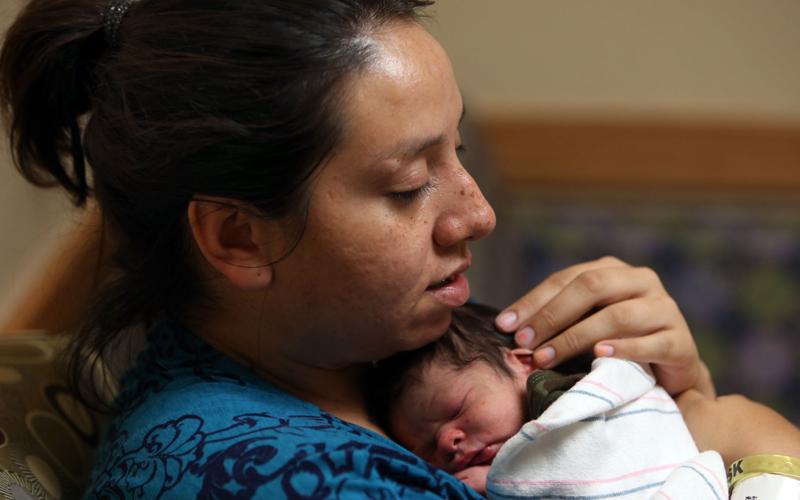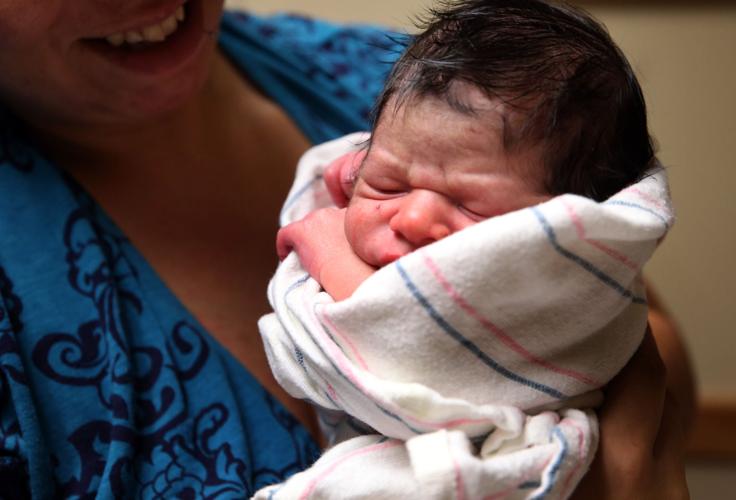Hospitalized at Tucson Medical Center since his birth last month, Orion Flores is one of a growing number of local babies exposed to opioids in the womb.
The need to help babies like Orion and their families was the impetus for a new program that aims to help parents quit their addiction to opioids like heroin and oxycodone, manage the challenges of parenthood and keep families together.
Orion’s mom, Melissa Flores, has been in the fledgling program — a partnership between Tucson Medical Center and CODAC Health, Recovery and Wellness — since her third month of pregnancy.
Services through CODAC include a rehab methadone clinic, support groups at the hospital neonatal intensive care unit for parents with addicted newborns and care for newborns withdrawing from opiates.
Since September, the program has helped about 40 families, said Kelly Irving, CODAC’s senior director of women’s services.
Withdrawal symptoms from an opiate addiction are the same for both children and adults, said Pat Brown, manager of the newborn intensive care unit at TMC. She said the withdrawal includes gastrointestinal problems, an inability to eat, pain and jitters. Often, the babies are inconsolable.
“They go through the same withdrawals that an adult would go through, except they’re not able to verbalize what that pain is,” Brown said.
Methadone
Most pregnant women who come into labor and delivery at TMC are forthcoming with their drug use because they want the best care for their baby, Brown said. Babies typically remain in the hospital for two to three months while they are treated for withdrawal, she said.
Flores, 25, has been receiving doses of methadone for treatment of her addiction to opiates at a CODAC clinic every morning since August, when she found out she was pregnant with Orion, her second child.
Babies like Orion whose mothers have drug problems are often diagnosed with Neonatal Abstinence Syndrome (NAS), which is a group of problems that often occur in a newborn who is exposed to drugs while in the mother’s womb.
Babies with NAS can have a number of symptoms, including an inability to eat and breathing difficulties.
Five babies, including Orion, have been born with NAS at the hospital since Jan. 1. There were 50 babies born with NAS at the hospital in 2016, TMC officials say.
Bruce Reddix, a pediatrician contracted to work with babies at TMC, said he has seen an increase in NAS-affected babies over the past few years. Statewide, the number of babies with NAS increased by 224 percent between 2008 and 2015, statistics from the Arizona Department of Health Services show.
Group sessions
Two rooms with white tile walls in the hospital’s neonatal intensive care unit (NICU) are designated for newborns like Orion who have been exposed to drugs. Each of the five babies the rooms can hold is assigned a nurse when they are born, and families are encouraged to be in the room with their children.
The separate area for these families benefits the parents because it encourages open conversation about where they are in their drug use, Brown said. There is a conference room next door where support groups are held by CODAC representatives for families.
Brown said it is best for all babies in the NICU that those displaying withdrawal or NAS symptoms are in a separate area.
“A lot of times the families are very much involved and the nurses are there with these parents pretty much all the time,” Brown said.
Irving said it’s generally mothers, grandmothers, and occasionally fathers and other family members who attend the group sessions.
In these sessions, parents are educated about substance abuse, treatment for themselves and their children, and they are encouraged to talk about what it feels like to have a child who was exposed to opiates.
Pregnancy
Flores found out she was pregnant with Orion when she went to TMC for a general health concern in August.
She immediately decided to move into a CODAC residential treatment facility called Las Amigas for four months so she could prepare for the birth of Orion and deal with her addiction.
Flores now is living at a Gospel Rescue Mission facility and is a part of a CODAC program called Mothers Caring About Self. She is working toward being able to support herself and her children.
“I go to a clinic every morning, except for Sunday, I get a take-home dose for that day,” Flores said. “We take our dose at the window and they watch us.”
Methadone used in the clinic is a synthetic opiate medication for treatment of people withdrawing from opiate addiction, said Irving. It is administered in liquid form.
“A lot of people continue to use opiates because they don’t want to experience this withdrawal because it is very intense, and then there is a high potential to relapse within the opiate addiction.” Irving said.
“Methadone gives them enough of an opiate to stop any withdrawal symptoms that they may have, but not enough to get high off of.”
State custody
In some cases, the Arizona Department of Child Safety (DCS) will remove a child from mothers who continue to combat addiction.
When baby Orion is discharged from the hospital, state officials will conduct an investigation to see if a case needs to be opened, program officials said.
Flores’ 19-month-old son, Jude, is currently in state custody and living in a foster home, but Flores says she hopes it is a temporary situation.
She sees Jude twice a week and is working on reunification, she said.
In cases where DCS is involved, CODAC will help the family and follow the case, Irving said.
“We are the treatment providers going to their child and family team meetings, to their court hearings, and providing updates on the progress they are making in their substance use and their ability to cope and live healthy, productive lives,” Irving said.
Irving said families can choose to remain with CODAC for case management or ongoing individual or group-therapy services.
Trauma therapy
Flores moved to Tucson from Massachusetts six years ago and said CODAC has provided the home, family and support system she lacked when she moved here.
“We like to make sure that they are connected with some sort of community support,” Irving said.
“If that’s a 12-step program, a club that they really enjoy going to, a church group, or something that connects them to other people in a healthy way, that’s when we know people are ready to move on from our services and live their lives.”
There are staff members at CODAC who are in recovery themselves who are on-site and available to help offer support, Irving said.
Flores said she looks forward to having more time with her children and on doing her ink drawings and other artwork.
“I’m excited to teach the kids how to draw. I try to get Jude to hold a colored pencil sometimes, but he doesn’t get it yet,” Flores said.
Irving said CODAC hopes to partner with a children’s provider to offer child-parent psychotherapy as part of the program.
It will be trauma-focused, where parents will be able to acknowledge the trauma they have caused their child, work to express that, and apologize for it, she said.
“It helps them move on from the guilt and shame that they have from causing this in the first place,” Irving said.





